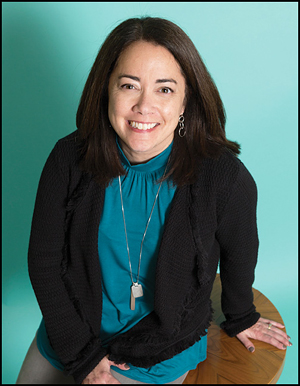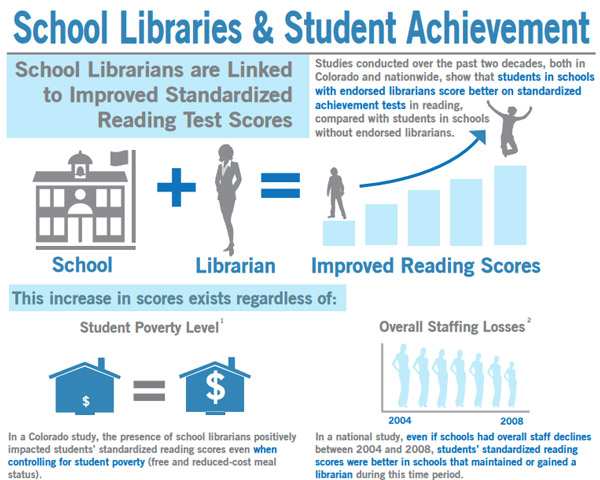Training Librarians as Evaluators to Show Library Value
 By Karen Phillips, SVP Global Learning Resources SAGE Publishing
By Karen Phillips, SVP Global Learning Resources SAGE Publishing
In a new series that celebrates innovators in libraries across the U.S., I have the privilege of diving deeper into the work of a segment of the 2017 Movers & Shakers announced by Library Journal in the spring. This week, I had the opportunity to catch up with Linda Hofschire, Director, Library Research Service, Colorado State Library, who does a great deal to support her colleagues that conduct their own research. Read her tips for approaching evaluation, data, communicating data below.

CURRENT POSITION
Director, Library Research Service, Colorado State Library
DEGREE
MLIS, University of Illinois at Urbana-Champaign, 2008; PhD in Mass Media, Michigan State University, 2003
FOLLOW
Photo by Patrick Heagney
Tell us about what you are doing to help librarians conduct their own original research.
In 2015, we launched a national training event for public librarians, the Research Institute for Public Libraries (RIPL). During this three-day data boot camp, participants learn how to evaluate their programs and services and use data for management, strategic planning, and demonstrating their impact. After the first event, we received an Institute of Museum and Library Services Laura Bush 21st Century Librarian Program Grant, and are using the funds to develop new models for expanding RIPL training, including regional events throughout the United States as well as an online Community of Practice, open to anyone interested in public library data and evaluation.
How can learning these techniques help a librarian demonstrate the value and impact of their library?
Public librarians have been under increasing pressure in recent years to provide evidence of their libraries’ worth. By systematically evaluating their programs and services, they can provide data to demonstrate their libraries’ value and impact. In addition, librarians can use their evaluation results to serve their users more effectively and efficiently. These improvements will result in stronger evidence of the meaningful differences they are making in their communities.
Do you have any examples of the types of data you have shared to show your library’s value and impact? How has it been received?
At the Colorado State Library’s Library Research Service, we conduct research and evaluation for libraries in Colorado and beyond. Several years ago, we learned how to tell more impactful stories about our library data when we ventured into the world of data visualization. Before this time, we tended to present our data in lengthy reports that featured a lot of statistical jargon. What prompted our move to data visualization was feedback from school librarians about our best-known body of research – a series of studies demonstrating the impact of school libraries on student achievement. These librarians told us that while the information in our reports was valuable, the presentation format was a barrier in terms of getting the attention of their administrators and other stakeholders. Based on that feedback, we realized that we needed to take a more visual approach to better meet the needs of our target audiences. So, we created a one-page infographic that presents the highlights of our school library impact studies. The field responded very positively: school librarians told us that the infographic was what they needed to begin a conversation about the impact of school libraries with their administrators.

From this experience, we learned that it’s not enough to simply have data-based evidence about the impact and value of libraries; the data needs to be presented in a format that is both meaningful and accessible to the target audience.
What advice would you give to a data-intimidated librarian who wants to begin this type of work?
Evaluation doesn’t have to be complex or require a graduate degree in statistics. Librarians who are new to data and evaluation can get started with small projects, such as reviewing several years’ worth of the data they are required to submit for IMLS’s Public Libraries Survey to look for trends, downloading an American Community Survey profile to learn about their community, or using a pre-designed survey from Project Outcome or Impact Survey to evaluate user outcomes. By engaging in these types of activities, librarians will be better-equipped to plan for the future, make decisions about where to allocate resources, and refine and improve their programs and services.
All of these efforts are great examples of thinking outside-the-box to reach your library's goals. How do you find the time and energy to implement these kinds of strategies, instead of just moving along the status quo?
The communities we serve are constantly changing, and if our libraries don’t keep up we risk becoming irrelevant. By evaluating their programs and services, librarians can effectively monitor and respond to changes in their communities, and connect with their users in ways that lead to transformation. While it may seem like evaluation is just one more thing to add to an already long list of responsibilities, it is important for librarians to realize that evaluation actually provides a structure for managing these responsibilities so that they can determine what should be prioritized and what can be given up.
SPONSORED BY
RELATED
ALREADY A SUBSCRIBER? LOG IN
We are currently offering this content for free. Sign up now to activate your personal profile, where you can save articles for future viewing










Add Comment :-
Comment Policy:
Comment should not be empty !!!